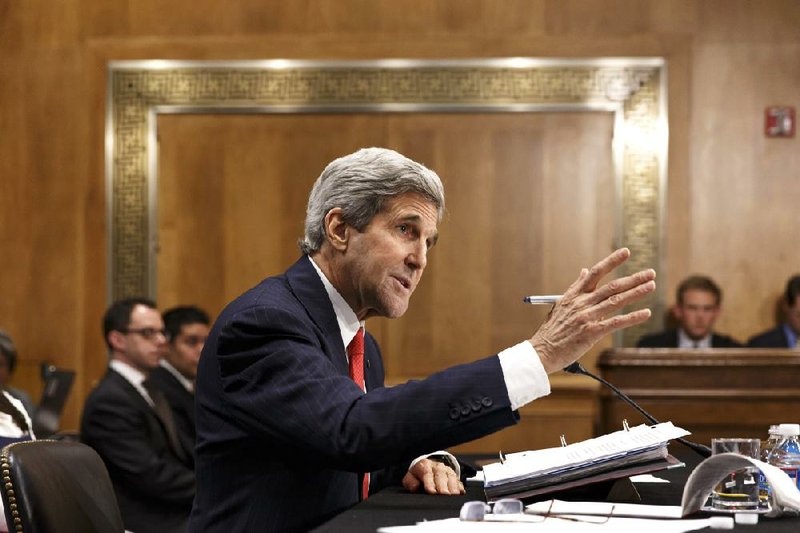WASHINGTON - The U.S. told Iran the ambassador it has chosen for the United Nations is “not viable” because he was part of a group that took over the American Embassy in Tehran in 1979, President Barack Obama’s spokesman said Tuesday.
The selection of Hamid Aboutalebi as U.N. envoy “is extremely troubling,” White House Press Secretary Jay Carney said. “The U.S. government has informed the government of Iran that this potential selection is not viable.”
Carney repeatedly referred to Aboutalebi as a “potential” choice and refused to say whether the U.S. would refuse to issue a visa if the government in Tehran decides press ahead with naming him.
Iranian Foreign Ministry spokesman Marzieh Afkham said in Tehran that the choice has been made and that Aboutalebi “is qualified for that position.”
The U.S. is leading negotiations aimed at getting Iran to halt its nuclear development program and has eased some sanctions on the Islamic Republic in exchange for progress. Obama, who has vowed he won’t allow Iran to produce a nuclear weapon, has received criticism from some members of Congress for agreeing to ease pressure on Iran.
The U.S. Senate passed legislation Monday to bar Aboutalebi from entering the U.S. because of his involvement with the group that took over the embassy, resulting in 52 Americans being held hostage for 444 days.
The crisis led to a break in relations between Iran and the U.S. that continues today.
The Senate measure sponsored by Republican Ted Cruz of Texas would amend the Foreign Relations Authorization Act by adding U.N. representatives who have participated in terrorist acts to the list of those to whom the president may deny visas. The list already includes those who’ve spied on the U.S. or could threaten national security.
Aboutalebi is Iran’s former ambassador to Belgium and Italy. He was a member of the Muslim Students Following the Imam’s Line, a group that seized the U.S. Embassy on Nov. 4, 1979. “Imam” was an honorific used for Ayatollah Ruhollah Khomeini, the leader of the Islamic Revolution.
“We share the Senate’s concerns regarding this case,” Carney said. The legislation is largely symbolic because the issuance of visas is part of foreign policy, the responsibility of the executive branch. Carney also said the U.S. has obligations as the host of the U.N.
A U.N. agreement prohibits the U.S. from imposing “any impediments to transit” to or from theU.N. headquarters. U.N. delegates to the U.S. from Iran, North Korea, Cuba and Syria are allowed into a limited zone around the United Nations building in New York and are restricted from other travel in the U.S.
But under the United Nations Headquarters agreement authorized by Congress in 1947, the president can deny visas to individuals deemed to pose a security threat, said John Bellinger, a former State Department legal adviser who is now partner at Arnold and Porter LLPin Washington.
“But it’s certainly something that would be controversial,” Bellinger said. “Other countries might criticize the United States, particularly because there’s an international law obligation to admit people, but the president could conclude that admitting someone who had engaged in past hostage taking of Americans continued to pose a security threat.”
Meanwhile, Secretary of State John Kerry said Tuesday that the U.S. could impose economic sanctions if Iran and Russia move forward with a reported oil-for-goods contract, discussing with a Senate panel an emerging threat to talks designed to finalize a nuclear deal with Iran.
The Russian business publication Kommersant has reported Russia plans to buy 500,000 barrels of Iranian oil a day, shattering an export limit defined by an interim nuclear agreement world powers and Iran reached last year.
While nuclear negotiators met in Vienna, Kerry told the Senate Foreign Relations Committee that the Obama administration has warned Iran and Russia about moving forward with the oil contract. It would violate the interim agreement reached in November in Geneva, he told the Senate panel, “and, yes, it could trigger U.S. sanctions.”
However, fresh U.S. sanctions on Iran would likely derail diplomatic efforts over the country’s disputed nuclear program.
With the nuclear talks resuming in Vienna between Iran and the six world powers, Kerry focused on the ability to conduct inspections and said that even if Iran comes up with the ability to produce enough material for one nuclear bomb, it would not necessarily have the capacity to deliver a weapon.
Tennessee Sen. Bob Corker, the Senate Foreign Relations Committee’s top Republican, and other lawmakers said the two countries were testing America’s resolve. “The administration must be prepared to restore all sanctions if Iran cheats,” he said.
Information for this article was contributed by Angela Greiling Keane, Julianna Goldman, Kambiz Foroohar, Ladane Nasseri and Kathleen Hunter of Bloomberg News and by Bradley Klapper, Vladimir Isachenkov, Donna Cassata and Lara Jakes of The Associated Press.
Front Section, Pages 4 on 04/09/2014

